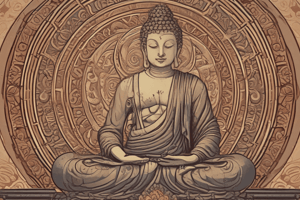Podcast
Questions and Answers
What does Plato believe the soul must do to achieve total perfection?
What does Plato believe the soul must do to achieve total perfection?
- Return to the world of form through knowledge (correct)
- Remain detached from the experiences of the body
- Distinguish between vices and sins
- Constantly engage with the material world
How does Plato characterize the relationship between the body and the soul?
How does Plato characterize the relationship between the body and the soul?
- Both the body and soul are equally perfect in their existence.
- The body allows for experiences in the material world, while the soul seeks perfection. (correct)
- The body is eternal and knows all, while the soul is corrupt.
- The soul is mutable and decaying, while the body is perfect.
According to Plato, what is the nature of the world of form?
According to Plato, what is the nature of the world of form?
- It is a distorted version of our material world.
- It is directly accessible through physical means.
- It is the perfect, immutable representation of reality. (correct)
- It is a temporary state that everyone experiences.
What is considered essential for a person to transcend the material world according to the content?
What is considered essential for a person to transcend the material world according to the content?
What aspect of philosophy does the content suggest is not exclusive to the West?
What aspect of philosophy does the content suggest is not exclusive to the West?
What does the term 'Buddha' signify?
What does the term 'Buddha' signify?
Which of the following best describes the main purpose of the four noble truths?
Which of the following best describes the main purpose of the four noble truths?
According to Buddhist philosophy, what is the first noble truth?
According to Buddhist philosophy, what is the first noble truth?
Which of the following statements is true regarding suffering and its causes?
Which of the following statements is true regarding suffering and its causes?
What does the 8-Fold Path aim to achieve?
What does the 8-Fold Path aim to achieve?
How are the concepts of body and soul described in the context of human existence?
How are the concepts of body and soul described in the context of human existence?
Which of the following principles is considered the first in Buddhist philosophy?
Which of the following principles is considered the first in Buddhist philosophy?
What is the relationship between the body and the soul according to the content?
What is the relationship between the body and the soul according to the content?
Flashcards are hidden until you start studying
Study Notes
Philosophy and Buddhism
- Philosophy derives from the Greek words "Philia" (love) and "Sophia" (wisdom), representing love for wisdom.
- Buddha, meaning "the enlightened one," emphasizes transcendence through meditation, revealing insights about existence.
- Core teachings include the Four Noble Truths and the Eightfold Path, focusing on overcoming suffering and achieving enlightenment.
Four Noble Truths
- Life inherently involves suffering; this is a fundamental aspect of human existence.
- Suffering has a cause, highlighting that every experience in life, including pain, stems from specific origins.
- There is a cessation of suffering, indicating that it is possible to end suffering through understanding and practice.
- The path to end suffering is outlined by the Eightfold Path, which provides a guide for ethical living and mental development.
Eightfold Path
- Right Understanding: Comprehending the nature of reality and the path of transformation.
- Right Intention: Cultivating thoughts of love, compassion, and non-attachment.
- Right Speech: Speaking truthfully and kindly, avoiding harmful language.
- Right Action: Engaging in ethical conduct and behaving in a way that does not harm others.
- Right Livelihood: Earning a living in a manner that respects life and does not cause harm.
- Right Effort: Diligently cultivating positive states of mind and abandoning negative ones.
- Right Mindfulness: Maintaining awareness of body, feelings, thoughts, and phenomena.
- Right Concentration: Developing deep focus and meditative absorption.
Relation of Body and Soul in Philosophy
- The human being is seen as a composite of body and soul, with the latter being essential for existence and identity.
- Classical philosophy, especially by Plato, views the soul as eternal, perfect, and possessing all knowledge before joining the body.
- The body is perceived as mutable and imperfect, serving as an experience medium for the soul.
- Plato advocates for the soul's quest to regain knowledge from the perfect "world of form," suggesting a transcendental journey beyond the material world.
Broader Context of Philosophy
- Philosophy encompasses diverse traditions, including Western and Oriental thought.
- The exploration of transcendental experiences and the role of the soul demonstrates a universal theme in philosophical inquiry.
Studying That Suits You
Use AI to generate personalized quizzes and flashcards to suit your learning preferences.




